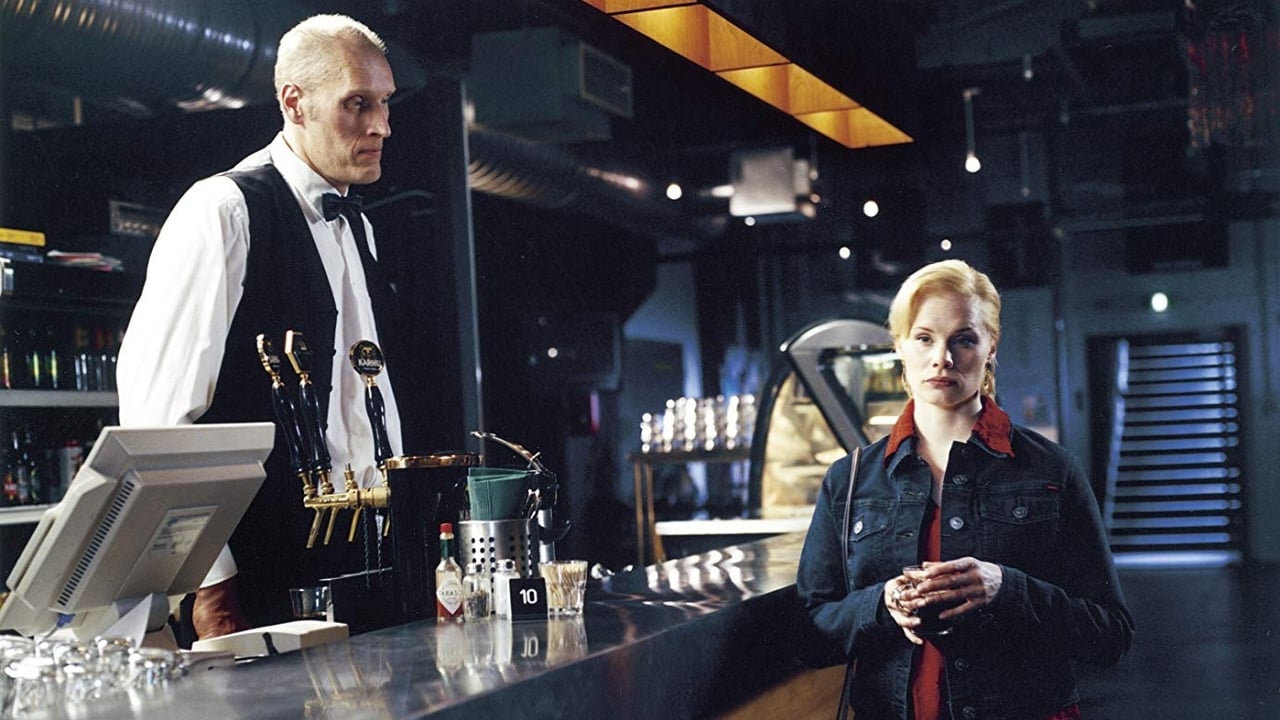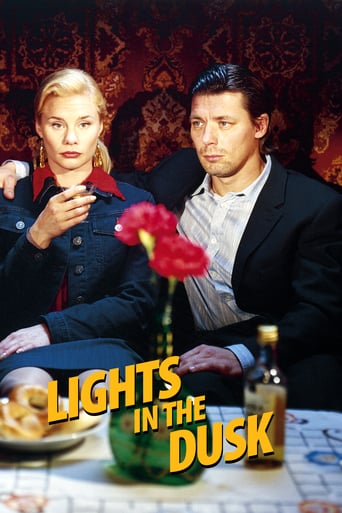

One of the best films i have seen
... View MoreThe plot isn't so bad, but the pace of storytelling is too slow which makes people bored. Certain moments are so obvious and unnecessary for the main plot. I would've fast-forwarded those moments if it was an online streaming. The ending looks like implying a sequel, not sure if this movie will get one
... View MoreExcellent characters with emotional depth. My wife, daughter and granddaughter all enjoyed it...and me, too! Very good movie! You won't be disappointed.
... View MoreJust intense enough to provide a much-needed diversion, just lightweight enough to make you forget about it soon after it’s over. It’s not exactly “good,” per se, but it does what it sets out to do in terms of putting us on edge, which makes it … successful?
... View MoreAki Kaurismaki is a great director, and yet, I would love to see him taking over some more ambitious projects. 'Lights in the Dusk' is a wonderful film from many aspects, and yet the lack of ambition of his principal hero seems to somehow overcome the whole atmosphere to an extent that it defies the logic, at least for the non-Finn viewer. The black and cynical humor in his Leningrad Cowboys series seems to have been overtaken here by plain despair.The hero of the film Koistinen (we never know his first name) is the loneliest man on Earth. He is a night-watchman who seems to be unable to connect with any of his colleagues, the only human who seems to care for him being the woman from the hot-dogs kiosk whose existence he barely acknowledges. He is not a bad man, he cares for animals, he has some baseless plans to open a business of his own who are doomed to failure, as is any tentative to look into the eyes of a woman or to just connect at all with another human being. His way of being makes him the typical victim for a criminal scheme, and the price to be paid of those who will abuse him is no more than showing him that somebody maybe cares.The cinematography of Kaurismaki is really exquisite. It is not only what he shows (the deeming lights and shades of the North, a city in an almost permanent night or dusk) but also what he does not show. An empty chair or a tripping closing door are for example his best means to describe a scene of violence without showing any violence. His actors are all wonderful, but their strength is better shown in the empty stares. They communicate or live their parallel lives in silence, and the film could have lacked any dialog without losing too much of his expressiveness.And yet, at the end, this story of victimization and resignation risks to be too depressing to be convincing. It reminded me the end of the wonderful Romanian film of Cristi Puiu 'Moartea Domnului Lazarescu'. As in Puiu's movie, it is only in the last sequence that the hero acknowledges the hand of human solidarity that is trying to reach him. Viewers leave with the feeling of wishing maybe the hero would have dared and achieved more, or that the director could have done the same.
... View MoreLights in the Dusk is an odd little animal, a film that gives you archetypes of a genre and delivers a story it insists you find interesting before branching off into something else and then ending in a manner that, at least I, found abrupt. The title of the film is Laitakaupungin valot, Finnish for what I can only presume to be 'Lights in the Dusk'. The title suggests hope, it suggests something light or positive; something to map onto amidst the ever-growing darkness or 'dusk' around you as the light fades and the black creeps in. Given the final shot of the film, Finnish director Aki Kaurismäki seems to stay true to his word and the film's title but I felt short changed; as if there was something else that could've developed once the film had ended to do with a psychological study of absolute no hope, rather than giving us what we get (which is genre film-making) and then finishing on an ambiguous note to do with us asking 'what happens next'? It's a strange feeling when you come away wanting to know what happens next in a film but it's an even stranger one when you feel what might've happened next could have been better than what you were given. All sorts of questions open up, mostly to do with love and relations and one's true feelings for the everyday person you feel like you know but really don't and whether or not the immediate resolution would have been enough for the film's hapless protagonist or whether he'd been pushed so far over the edge that revenge now seemed obligatory to him.But hey, maybe that's the point or maybe Kaurismäki will revisit the cut off point in the future. The film as a whole is indeed an odd beast but an intriguing one, peeling off for long passages of scenes without dialogue before advancing the story at a relatively speedy pace, something that echoes life as a whole perhaps. The film is not shy of changing its pace as it places its noir infused, hapless protagonist at a dinner table waiting for his date as the minutes tick by. The next minute, he's showing her around where he works and this-is-this-and-that-is-that and the scene has finished.The hapless lead is Koistinen (Hyytiäinen), a security guard at a Helsinki jewellers doing the night rounds more often than not. He meets Mirja (Järvenhelmi); the smoking, mysterious, alluring and relatively quiet femme fatale of the genre piece who works for some crooks that have bigger fish to fry, notably the jewels at Koistinen's work, and he is the way in. The film's idea looks good on paper, in fact it looks and sounds like a cracking yarn with the sort of sneaky approach behind it revolving around it being a 'hiest' picture not entirely about the heist. Ever think about when you last watched a really iffy heist film like '3000 Miles to Graceland' and you see any number of security guards or police officers getting shot or taking some other flack during the robbery? Well Lights in the Dusk is the sort of film that follows those wounded peace keepers (either physically, psychologically or whether they're 'in' on it or not) and develops them in the aftermath rather than the thieves.The film's overall tone reminded me of another Scandinavian film of recent times, entitled 'The Bothersome Man' in its brooding and slow build up, a very quiet film; ominous at times as these strange places or people just exist they do nothing much more but exist right there, doing and saying and expressing as little as possible. The editing and delivery in both films is very drab and downbeat but purposely so and thus gives off an odd atmosphere of the mysterious and uncertain. Koistinen and Mirja are not two of the most charismatic lead characters in a film ever but their relationship is never even 'so' in the first place so whatever communication or fondness there is will always be a result of Mirja's larger goal which is related to her employers larger goal.To say whether the heist happens and what happens next feels like a crude spoiler. Just to say, the study of loneliness and the parallels between the alienation at work twinned with the feeling of being left out resonates as to where Koistinen ends up at various intervals, following his 'cutting off of contact' with said female interest. I just felt sorry for the guy; someone who just keeps getting knocked down and, I feel, builds up such venom of which we never get to see the consequence of, something that I've already said might make for an interesting study, immediately post-ending of this picture. This is a man's 'prior tragedy' event in any Hollywood film you like stretched to 80 odd minutes and for pulling that off you have to commend the director. In a sense, anyone that watches this are playing a 'Koistinen' role themselves with the director as the seducer, leading you down a route of the noir and of the 'hesit' genre before branching off to look at the results of said event and then ending on a distorting note leaving you wanting more. Regardless, I look forward to seeing some of Kaurismäki's other work in the future.
... View MoreClocking in at a pithy one-hour-and-fourteen minutes, "Lights in the Dusk" is an existentialist Finnish comedy in which a mild-mannered night watchman, who seems to be living in a world of his own, becomes an unwitting patsy in a jewelry-store robbery when he opens up to a woman who has seemingly taken a romantic interest in him.As the much put-upon working man who allows a femme fatale to trick him into doing her dirty work for her, Janne Hyytiaien gives a marvelously deadpanned performance that perfectly reflects the spare, archly humorous world director Aki Kaurismaki has created for the film. With a tone of cool detachment, the script rarely lets us into the mind of this strangely uncommunicative and inscrutable young man, whose emotions and thoughts are always buried somewhere deep beneath an expressionless surface. Yet, somehow, despite his reticence, he still manages to pique our interest and engage our sympathy, primarily because his predicament and his lack of a conventional reaction to it are both so comically unsettling. We find ourselves identifying and rooting for him even though we don't really get to know all that much about him. In a way, he reminds us a bit of Meursault from Camus' "The Stranger," a man so emotionally detached from the world around him that his actions aren't always explicable to those of us who are residing in the "real world" watching him perform them.Though it is a difficult film to pigeonhole, "Lights in the Dusk" is a modest, unassuming work that touches both the heart and the funny bone in roughly equal measure.
... View MoreLike Kaurismaki's two previous films, 'Drifting Clouds' and 'Man Without a Past', this conjures up a world of despair, but shot in the Formica tones of a Doris Day comedy, without the emollient presence of incidental music. The protagonist is almost totally inarticulate; it's impossible to tell whether this is through depression or dictated by an immutable moral stance. The night watchman, Koistinen, will not reveal the identity of the girl who set him up, exploiting his love-hunger, even when it results in his taking the rap for a bank robbery. At the same time he is blind to the love felt for him by an honest and wholesome burger-stall owner. The film takes in the breadth of Finnish society from dreadful poverty to obscenely glossy wealth, in murky aerial shots of the city as much as in the close-ups. Rather than stand up for himself, Koistinen practically sets himself up again and again, getting knocked down, or beat up on a regular basis. He is reminiscent of Meursault, the hero of Camus' The Outsider, who cannot produce the basic reactions and hypocrisy that society expects of him. But as with 'Drifting Clouds' the piling-up of grief and injustice leads to a tiny spark of hope in the final frames - and Kaurismaki admits to being a soft-hearted old man, so he expects us to see it that way. En route, it's a strange and dreamlike experience, being in the world of Kaurismaki. CLIFF HANLEY
... View More